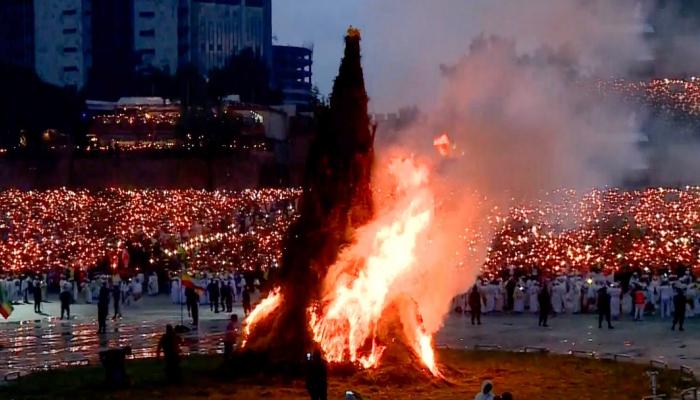The Commemoration of Meskel - ENA English
The Commemoration of Meskel

BY SOLOMON DIBABA
The Ethiopian New Year comes up with various religious and cultural celebrations which are marked indoors among families and outdoors with the entire public in mammoth paraphernalia. Meskel, the holiday celebrated in commemoration of the unearthing of the True Cross is celebrated with the building of Demera bonfire.
This year Meskel is celebrated in Ethiopia even when two more tangible Ethiopian heritages, the Bale Mountain National Park and Gedeo Natural landscape have been inscribed as world tangible heritages. Ethiopia has registered 15 tangible and intangible world heritages becoming the top country in Africa in registering the heritages.
Meskel, meaning the cross in Amharic is an annual religious national holiday among the faithful of Ethiopian Orthodox Church. It takes place on the 27th of September.
In addition to its religious values, Meskel coincides with the end of the main rainy season (June to September) and the onset of Ethiopian spring in which fields and meadows in the country are carpeted with mesmerizing Ethiopian daisies, locally known as Adey Abeba, with their captivating yellow colors which majestically carpet the Ethiopian fields. The daisies prevail September until a few weeks of October and then disappear and reappears same period the following year.
The commemoration of Meskel started with Demera, a ceremonial burning of a large bonfire. It is a special event that is conducted on the Eve of Meskel to recall the smoke that led Empress Helena to the site of the True Cross.
In the afternoon of September 27, dozens of Sunday school students and members of the clergy and move through Meskel Square chanting spiritual songs that last for hours. Hundreds of thousands of people from diverse communities also flock to the square in Addis Ababa as colorfully dressed priests chant hymns and prayers and perform their unique rhythmic dance in front of the pyre. At the climax, the patriarch of the Ethiopian Orthodox Tewahedo Church lights the bonfire.
According to the teaching of the church, the True Cross, was thrown in a ditch or well, and then covered with pile of dirt and earth for many years until Empress Helena, mother of Constantine, guided by revelation identified the place where the cross of Jesus had been buried.
Accordingly, Empress Helena was told to build a bonfire, light it and discover the cross that had been buried. She ordered the people of Jerusalem to bring wood and make a huge bonfire. After adding frankincense, the bonfire was set ablaze. Then, the smoke raised high up to the sky and then bended to the ground, spotting exactly where the True Cross had been buried. As darkness begins to set in, the Demera is set ablaze, declaring joyful jubilation and ululation.
The following day is the official day of the commemoration of the finding of the True Cross, Ethiopians attend liturgy and a feast and celebrate with family and friends. Many take the ash from the Demera and apply it on their foreheads with a shape of a cross. It is also an occasion when many urbanites, for example, the Gurage people pay a visit to their families in rural villages to mark the holiday together.
The Demera festival of the Meskel holiday, dates back to 1600 years. It has been registered as world intangible heritage by UNESCO since December 2013, as the first intangible Ethiopian heritage.
During the festival, a special species of birds known as ‘YeMeskel Wof -Meskel’s Bird’ also appears. Generally, the word 'YeMeskel Wof' is used to call the four bird species, namely the northern red bishops, indigo-birds, whydah and widow birds, and yet it has more than ten species under it. These birds are also enjoyed by bird watchers during Meskel.
These birds are endemic to Ethiopia, and do not migrate from one place to another as other birds do. September is their reproduction season and the color of their feathers gets changed in order to attract opposite sexes. Due to this change, it looks that they are new birds that appear only at this time of the year.
Meskel is a major tourist season in Ethiopia. Thousands of tourists from many countries converge in Ethiopia to enjoy the festival. Tourists particularly enjoy Meskel celebration in Addis Ababa.
The True Cross is said to have been brought to Ethiopia and is kept at Amba Gishen, which itself has a shape of cross.